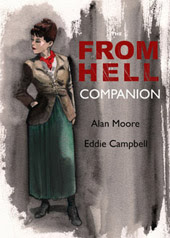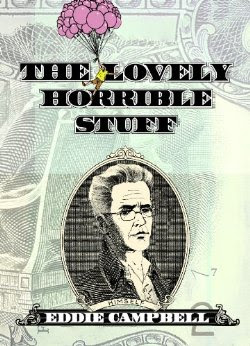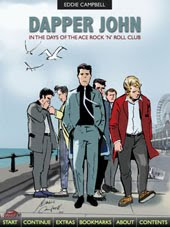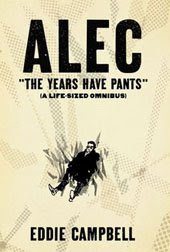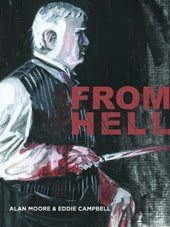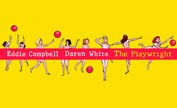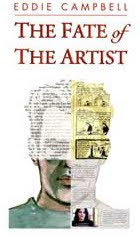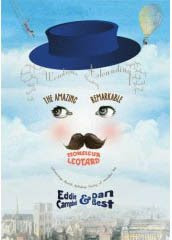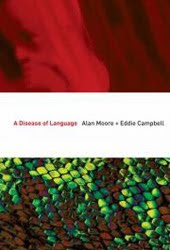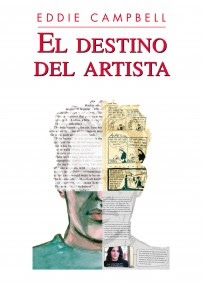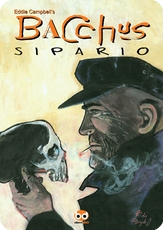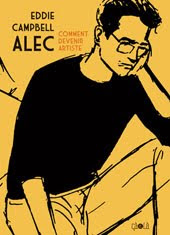The empty jug.
C hecking out the various blog reviews the other day, I fastened upon this one: Kampung Boy: Not a member of the Legion of Superheroes-June 5- on the blog of one (since I've heard there's more than one) Matt Brady of Chicago Ill.: "The book is more illustrated prose than comics (at least by the Scott McCloud definition), with most pages consisting of text surrounded by pictures..." and it reminded me that I've been making some notes over the last couple of months on this odd tendency, this need to say what a thing is NOT.
 Brian Talbot in his new book Alice in Sunderland also invokes McCloud. He resolves a scene in which he is assailed by authorial doubt by having Scott appear like a prophet and deliver the reassuring line, "Comics can be about anything." It's not done without irony, but we come away taking it as a serious declaration, and unlike Lat (Kampung Boy) who is working outside of this subculture, all of Talbot's typographical decisions tell us clearly that he's making 'a comic book', from the carefully cascaded balloon-text units to the compositional relationship of figure to frame; indeed the whole pictorial space is written in comicbook syntax.
Brian Talbot in his new book Alice in Sunderland also invokes McCloud. He resolves a scene in which he is assailed by authorial doubt by having Scott appear like a prophet and deliver the reassuring line, "Comics can be about anything." It's not done without irony, but we come away taking it as a serious declaration, and unlike Lat (Kampung Boy) who is working outside of this subculture, all of Talbot's typographical decisions tell us clearly that he's making 'a comic book', from the carefully cascaded balloon-text units to the compositional relationship of figure to frame; indeed the whole pictorial space is written in comicbook syntax.
Why the need for it to 'be comics'? That's the common denominator in each of the above quotes, even though they appear to be implying opposite positions for McCloud, on one hand that he has placed limits on comics and on the other that he has freed them from limits? An unimpassioned observer might say, why should it matter? If it's 'not comics' it would be ipso facto something else. However, and this may seem strange to the same observer, to say that a thing is 'not comics' is, in the eyes of the folk we are talking about, to ban it to oblivion.
I found a clue to this conundrum recently in an exchange with Stephen Frug on his blog about his contention that a page within The Codex Seraphinianus 'is comics'. He wrote: "I think that the reason I so strongly resist your resisting of the whole idea of definitions in discussing McCloud is that... I experienced it as an attempt to stuff me -- us -- - back in a jail from which we'd escaped."
'Us'? Then let's picture a loose-knit society of fellow travellers, whose members have chosen to express themselves through a genre of art, and to follow the efforts of their confreres in this same genre of art, and furthermore, for their collective benefit, to raise its public respectability. However these ties tend to suggest something stronger than just an 'interest' (or a 'genre', half of my readers are now saying). What is it that unites its members? An allegiance? To what? Not to a political cause or a religious scripture or even a charismatic personality, but to a form. A cold hard formula. McCloud's empty jug.
Though the jug would have it otherwise, it is in the nature of such groups to foster conservatism, and the the first commandment is always the definition. It's not just in 'comics' that I continually run up against definitions. When I wrote about A Humument on 12 march, I read that it was considered to be an 'artist's book', so I figured I ought to read the literature on that just in case I inadvertently 'put my foot in it'. I googled the words and landed in a forum where folk were arguing about the definition of the term 'artist's book'. There's no profit in going back there, so let this stand in for it, from SF Weekly:
In the middle of the tug- of-war over artists' books By Karen Silver October 31, 2001
It's always fun to go to a museum exhibition and step into a pile of steaming controversy. This time the show in question -- "Artists' Books in the Modern Era 1870-2000" at the Legion of Honor -- is a lovely presentation of 180 volumes from the impressive, immense collection of Reva and David Logan, who began amassing works by everyone from Joan Miró to Pablo Picasso to Jasper Johns in the 1950s. At the exhibit's entrance is the first sign of confusion. On the introductory wall panel, the curator attempts to explain the content: "Artists' books (also called livres d'artistes or illustrated books) combine text with art, usually original prints created especially for that volume, to form a unified whole." Under this vague definition, The Stinky Cheese Man might be considered an artists' book.
When I started this blog six months ago, I thought it wise to do some research before throwing myself into the fray. To figure out what a blog is expected to be and do if nothing else:
Just what is a blog, anyway? By Michael Conniff -09-2005
Defining this variable form is not easy in the highly opinionated blogosphere - nor is it simple in the increasing number of newsrooms that are embracing blogging. To blog or not to blog is no longer the question.
The question now: What is a blog?
Capturing the blogging beast is no small matter, not when everybody from the lonely scribe in Paducah to me-too mass media in Manhattan is trying to get arms and minds around the virtual blob now encroaching online. Nor is the act of definition without consequences, as individuals and corporations make plans (and even multimillion dollar acquisitions) based upon the momentum behind something they can no more easily define than a Rorschach splotch.
This commentary piece from the Australian oddly thinks the crucial element in a blog is the comments box:
Blogs still rule, despite the dictatorship of idiotsMarch 28, 2007
Mark Day
Not everyone agrees. As a blogger identified as Jack put it this week: “All weblogs are personal, even the ones of the arrogant journalists bloggers, so called gatekeepers of information, though they treat their audience with contempt. Most journalist blogs are not even blogs, just opinion pieces with a comment section, which the so-called blogger journo peruses once a week and throws a couple of ad hoc replies every now and then to say I’m listening, which they are clearly not.”
Jack says blogs should provoke argument rather than being a convenient response mechanism for readers.
But there are traps in this because blogs are frequently hijacked by people who regularly put forward their own often twisted versions of truth on any subject - call them fixations - and skew the result into what The Sunday Times called “a dictatorship of idiots”. Most times the casual reader wouldn’t have a clue about this because in a blog format the opinions of nutters are given the same kind of space and display as the opinions of the aforementioned erudite ruminators.
The information is no longer arranged in order as in textbooks. It is not locked together; we all receive it in a different order, according to our own 'clickstreams'. There is no hierarchical structure to keep the crap, the 'stinky cheese' and 'the nutters', from contaminating the rest. Did 'we' think of that when we wanted all arts to be considered equal? Definitions are sought to control quality and meaning since there is NO FINAL AUTHORITY. We have overthrown God and the King and there is no bouncer at the door. We are in a mortal panic. Steven King's langoliers are eating the ground we're standing on and we're grasping for something that might take us through a rip in the universe to where everything makes sense.
Labels: comics crit 1








